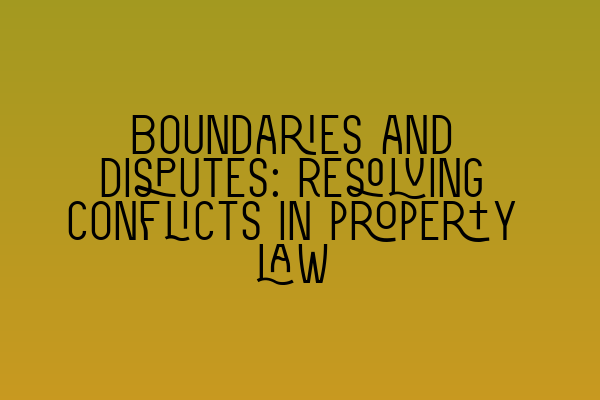Boundaries and Disputes: Resolving Conflicts in Property Law
When it comes to property ownership, boundaries play a crucial role in defining the extent of your land. However, disputes can often arise between neighboring property owners over the location, maintenance, and ownership of these boundaries. Resolving these conflicts requires a thorough understanding of property law and a strategic approach to finding a resolution that satisfies all parties involved.
The Importance of Defining Boundaries
Clear and accurately defined boundaries are essential for property owners as they determine the extent of their land, the rights they hold over it, and the responsibilities they have in maintaining it. Boundaries can be defined through various means, including physical features like fences, walls, or hedges, as well as legal surveys and official documentation.
Properly defined boundaries provide property owners with a sense of security, ensuring that their land is protected and their rights are upheld. However, when disputes arise regarding the location or ownership of these boundaries, it can lead to uncertainty, tension, and even costly legal battles.
Common Types of Boundary Disputes
Boundary disputes can occur for a variety of reasons and can manifest in different ways. Some common types of boundary disputes include:
- Boundary encroachment: This occurs when a structure or object from one property extends beyond its defined boundary and encroaches upon a neighbor’s land. It can involve anything from a fence overstepping the boundary line to a tree spreading its roots into a neighboring garden.
- Boundary ambiguity: In some cases, boundaries may not be clearly defined or documented, leading to confusion and disputes about the exact location or extent of the land belonging to each owner. This can occur when older properties change hands, and historical records are incomplete or unclear.
- Boundary maintenance: Disputes can also arise when it comes to the maintenance and upkeep of shared boundaries, such as fences or walls. Questions may arise regarding who is responsible for repairs, replacements, or alterations to these structures.
- Trespassing: When one party intentionally or unintentionally crosses over the boundary line and enters another’s property without permission, it can lead to conflicts and legal consequences.
- Adverse possession: In certain situations, a neighbor may claim ownership of a portion of land through adverse possession, which occurs when they have openly and continuously occupied the land for a specified period of time, typically several years.
Resolving these boundary disputes requires a careful examination of the facts, relevant legal principles, and often the engagement of a skilled solicitor who specializes in property law.
The Role of Mediation and Alternative Dispute Resolution
Before resorting to costly and time-consuming litigation, it is often advisable to explore alternative dispute resolution methods, such as mediation or negotiation. Mediation offers a voluntary and confidential process in which a neutral third party assists the parties involved in reaching a mutually agreed-upon resolution.
Mediation can be a cost-effective and efficient way of resolving boundary disputes. It allows the parties to express their concerns, interests, and desired outcomes, while also fostering open communication and collaboration. A skilled mediator can help facilitate productive discussions, explore potential solutions, and guide the parties towards a resolution that meets their needs and interests.
Mediation is particularly beneficial in boundary disputes as it allows the parties to maintain a relationship as neighbors, rather than adversaries, and find a way to coexist harmoniously going forward.
The Importance of Seeking Legal Advice
While mediation and negotiation may be effective in many cases, there are situations where legal intervention is necessary to protect your rights and interests. Seeking legal advice from a solicitor who specializes in property law is essential, especially when the dispute involves complex legal issues or significant financial implications.
A knowledgeable property solicitor will assess the specifics of your situation, review relevant documentation, investigate the facts, and provide you with expert guidance on the best course of action. They will advocate for your rights, represent your interests in negotiations, and, if required, litigate on your behalf.
It’s important to approach a boundary dispute with a proactive mindset and gather as much evidence and information as possible to support your case. Document any relevant conversations, gather photographs or surveys that demonstrate the boundary lines, and keep a record of any incidents or encroachments that occur.
Conclusion
Boundary disputes can be challenging and emotionally charged, but with the right approach, they can be resolved effectively. By engaging in open communication, exploring alternative dispute resolution methods, and seeking legal advice when necessary, you can find a resolution that clarifies the boundaries and helps maintain a harmonious relationship with your neighbors.
If you require further assistance or advice in navigating boundary disputes or any other property law matters, contact SQE Property Law & Land Law. Our team of experienced solicitors specialized in property law is here to provide you with expert advice and guide you through any legal challenges you may encounter.
Related Articles:
- Legal challenges in property transactions: A comprehensive guide
- Dominate Property Law Questions: Avoiding Common Pitfalls
- Land Law Revision Tips: Ace Your Exam Preparation
- Mortgages and land law: Essential considerations for property transactions
- Environmental Ethics in Land Law: Balancing Development and Sustainability
